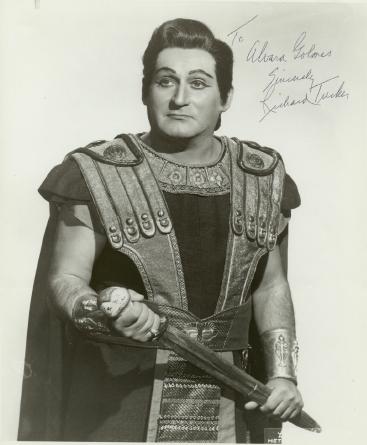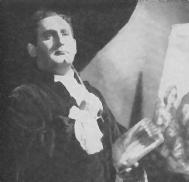Richard Tucker
He was born Rivn Ticker into a family of recently arrived immigrants from Sokyrjany (Ukraine). His musical leanings were
evident early on, and he became a (self-taught) cantor at the Brookly Jewish Center, and a radio tenor. He married the
sister of Jan Peerce many years before either of the two men was an opera
singer.
Tucker started studying voice late, at 27 years old (1940), with various New York teachers, Paul Althouse among them. Tucker's debut as a classical tenor followed in 1943, first in concert,
then on stage with the touring Salmaggi Opera Company at the Jolson Theater in New York, as Alfredo.
In January 1945 as Enzo Grimaldo, he made his debut at the Met, where he stayed for the rest of his life, singing 738
performances. His first European performance was as Enzo, too: in 1947 at the Arena di Verona. He made relatively few
guest appearances; regularly only in Chicago and Buenos Aires (Colón), sporadically in San Francisco, Vienna
(Staatsoper), London (Covent Garden), Milano (Scala, debut in 1969), Florence, Rome, Parma, Barcelona and New Orleans.
Alvaro was considered his best role; other than that, he sang Alfredo, Duca, Rodolfo, Cavaradossi, the other Rodolfo
(Luisa Miller), Hoffmann, Lenskij, Gabriele Adorno, Riccardo, Calaf, Puccini's des Grieux, Lyonel, Don José,
Manrico, Radamès, Andrea Chénier, Samson, Canio or Éléazar. At high Jewish holidays, he always
returned to the synagogue as a cantor (often in Chicago).
He died from a heart attack in a town in Michigan where he was to give a concert together with Robert Merrill.
I've never been crazy about Tucker, the opera singer. While he admittedly left some excellent recordings, I tend to find
his style mannered and his top laboured; and his Italian diction is plain horrible. The sheer opposite is true in
cantorial music. Although the musical arrangements in his cantorial recordings are a matter of taste, Tucker is
fascinating there, one of the best cantors ever.
Reference 1: Kutsch & Riemens, reference 2
La Gioconda – New York, Met, 25 January 1945 La traviata – New York, Met, 15 December 1945 Rigoletto (Act 3) – New York, Met, 27 January 1946 Boris Godunov – New York, Met, 21 November 1946 Rigoletto – New York, Met, 7 February 1947 Madama Butterfly – New York, Met, 2 March 1947 La bohème – New York, Met, 22 November 1947 Un ballo in maschera – New York, Met, 10 December 1947 Cavalleria rusticana – Cleveland, Met tour, 14 May 1948 Lucia di Lammermoor – New York, Met, 14 January 1949 Simon Boccanegra – New York, Met, 28 November 1949 Manon Lescaut – New York, Met, 26 Decemebr 1949 Tosca – New York, Met, 11 February 1950 Die Zauberflöte – New York, Met, 25 November 1950 Don Carlo – New York, Met, 2 December 1950 Die Fledermaus – New York, Met, 20 December 1950 Faust – New York, Met, 14 January 1951 Così fan tutte – New York, Met, 28 December 1951 Carmen – New York, Met, 31 January 1952 La forza del destino – New York, Met, 10 November 1952 Andrea Chénier – New York, Met, 23 December 1954 Les contes d'Hoffmann – New York, Met, 14 November 1955 Evgenij Onegin – New York, Met, 28 October 1957 Martha – New York, Met, 26 January 1961 La fanciulla del West – New York, Met, 23 October 1961 Turandot – New York, Met,4 November 1961 Il trovatore – New York, Met, 11 December 1963 La Juive – New York, Carnegie Hall, 12 March 1964 Aida – New York, Met, 2 January 1965 Luisa Miller – New York, Met, 8 February 1968 Pagliacci – New York, Met, 8 January 1970 Samson et Dalila – New York, Met, 10 December 1971 L'Africaine – New York, Carnegie Hall 20 March 1972 I would like to thank Thomas Silverbörg for the recordings (Africaine, Chénier, Rigoletto, Gioconda, Boccanegra, Trovatore, Interview) and for the picture in Tosca. Reference: Museo teatrale: Richard Tucker, il tenore del Metropolitan di New York, Milano 27 aprile–1 giugno 1991. Reference : James A. Drake: "Richard Tucker. A biography" E. P. Dutton, New York, 1984. I would like to thank Juan Dzazópulos for several corrections and addenda. |

